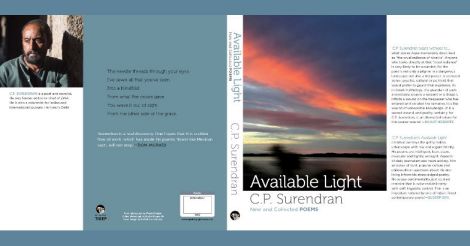Five years ago at the Kovalam Literary Festival in Kanakakkunnu, Thiruvananthapuram, noted journalist and poet C. P. Surendran had four volumes of poetry in his name.
At the jamboree, he read from Lost and Found, his ingenious novel about siblings torn apart by the vicissitudes of fate and ending up influencing each other’s lives unwittingly.
He followed it up with a novel called 'Hadal' based on the ISRO espionage case. His first novel, 'An Iron Harvest', was inspired by the infamous disappearance of engineering student and suspected Naxalite Rajan during the Emergency.
The brilliance of the prose stands out in the Marquesian backdrop and polychromatic plot delineation in his fiction.
Therefore, it is a surprise to learn about Surendran’s predilection for the form of the novel, as he struck me as unmistakably a poet first and foremost.
He had announced a decade back that poetry had lost its charm for him. So the volume under review comes as an afterthought and considering the ‘collected’ tag, a likely swansong to sign off the genre.
CP is on record that English afforded him a refuge from a illustrious lineage as he did not want to be burdened with what was shared by his father, the late Pavanan, leftist Malayalam writer and pioneering rationalist.
English, he felt, had a sensibility of tolerance that was closer to him than the language of his roots, Malayalam, which was too insular in its transactions.
C. P. Surendran has also penned a script for Anand Mahadevan’s eponymous biopic on Odisha freedom fighter Gour Hari Dastaan.
His poetry collections are ‘Gemini II’ (1994), ‘Posthumous Poems’ (1999), ‘Canaries on the Moon’ (2002) and ‘Portraits of the Space We Occupy’ (2007). ‘Available Light: New and Collected Poems’ is a new omnibus that compiles poems from the earlier collections in addition to brand new creations. The poems in these volumes attest to his standing as a frontline English poet among contemporary Indians born after Independence. Vikram Seth, Jeet Thayyil, Gopi Kottoor, Meena Kandasamy, Ranjit Hoskote and the late Vijay Nambisan are some prominent stars in this galaxy. Hoskote, one time colleague of Surendran, has written a scholarly and incisive foreword to the book wherein he fathoms the psyche of the poet in the context of his inner turmoil. The book opens not with a poem but a prose requiem to Nambisan written on his untimely passing this year. Surendran recalls that Nambisan along with Thayyil and him were Dom Moraes’s finds. In the literary microcosm of late ‘80s Bombay, Moraes along with Nissim Ezekiel and Adil Jussawala formed the avuncular trinity of mentors to these rebellious protégés. The title 'Available Light' draws from the terminology of cinema. Legend has it that available light modulated through reflectors into bounce light opened up the possibilities of realism for one of the greatest realist filmmakers of all time, Satyajit Ray. The poems are likewise realistic, shorn of the glaring limelight of romanticized claptrap. They have been deliberately shuffled to break any monotonous rhythm that the collections that originally carried them might have induced.
The German poet-philosopher Friedrich Schiller categorized poets into the naïve and the sentimentalist. By sentimentalist he meant the thoughtful, troubled modern poet who has lost his childlike character and naiveté. On the other hand naïve poets write poetry spontaneously without worrying about the intellectual or ethical consequences of their words and heeding no attention to what others might say. Surendran belongs to the latter bracket. His creativity is unforced and his poetic evolution organic. This does not imply that the poems are naïve or simple or even simplistic; many of them require multiple readings to assimilate the essence in full. Telling social commentaries such as ire over a gang rape in the poem Shakti Mills, lamentation on a beef lynching and mindless killings in Gaza or Kashmir resonate throughout the book. Journalistic inquisitiveness being his stock-in-trade, it is but natural that a spirit of seeking informs his craft. The forcefulness of the creative output of C.P Surendran, L’Enfant terrible of Indian English writing, will knock the creeping complacency out of the reader habituated on pusillanimous prose and poetry. Some of the poems are terse; some can only be termed elongated haiku. Gentle irony marks a natty poem like ‘Reading Glasses’.
Wearing the well framed word
Over his eyes
He saw the Universe
Either smaller or bigger
Than it was,
But never once
For what it is.
While a poem like ‘Family Court’ is plain and free of frills, the one immediately following it titled ‘Goal Keeper’ plumbs the working of a goalie’s mind in fantastically rich imagery that brings out his loneliness under the crossbeam. The goalie perceives himself as a ‘monarch of empty air’ even as the ball ‘goes kissing boots in gratitude in its shifting flight from loyalty to treason’.
This passage from the poem ‘Whisky Priest’ is a bouquet to Bacchanalia from the poet.
He waits for the day to splash
Over broken cups, be gone with the matutinal,
Awaits the appearance of the vespertine star,
Malodorous glasses with crimson mouths, some just crass.
He is unable to reason with the room’s panic season;
Pontiff, last to exit from the nave of every bar,
Stool stuck to the altar of his ass.
These new and collected poems are no doubt a collectible delight for poetry lovers. Available Light is a single malt experience in the desi literary cocktail party, where the insentience of spurious verse dominate the proceedings.

























